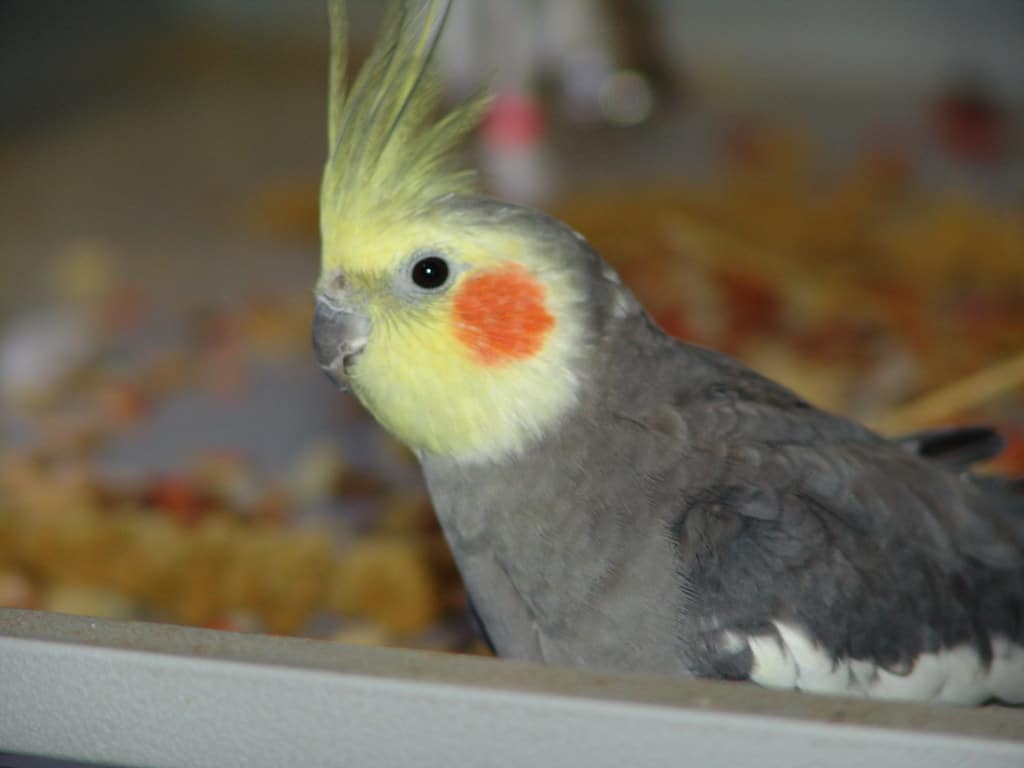Cockatiels, like most birds, are light sleepers. Subtle sounds or shifts in light can stir them from a sound sleep. Far from the shallow slumbers of their wild ancestors, pet cockatiels have adjusted to the comforts of a steady home environment, and as a result, they’ve evolved separate sleep patterns. However, during the night, one question that troubles many bird owners is, “can cockatiels sleep with noise?”
Practically, it’s not significant background noise that disrupts their deep sleep. On the contrary, it’s the abrupt, loud noises that cause the issue. You might have observed your pet cockatiel startled awake by a sudden sound in the middle of the night. This can lead to a common yet critical situation called ‘night fright’, where the bird flits about the cage, potentially injuring itself on the cage bars. In such circumstances, having a cage cover and night light inside the cockatiel’s cage can mitigate the frequency of these frights.
Your feathered friend spends its day in a noisy environment where the daytime cage is probably bustling with activity, they’ve got used to chaos. However, for a good night’s sleep, pet birds like cockatiels need quietness, not complete silence, just enough to relax without being startled awake by sudden noises. As bird owners, it’s your responsibility to provide an adequately peaceful sleeping cage for a healthy bird. That means ensuring your cockatiel has enough sleep without disturbing noises, keeping away from the TV, other pets or noisy household activities, thereby ensuring the bird’s sleep is uninterrupted and healthy.
Understanding Cockatiels’ Sleep Cycle
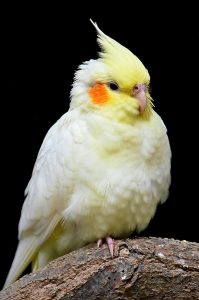
Just like us, cockatiels sleep at night. These feathered friends are diurnal animals, meaning they’re most active during daylight hours. The sleep patterns of your pet cockatiel play a crucial part in its overall health. So, it’s essential to understand your cockatiel’s sleeping habits.
Unlike humans, who tend to sleep in one solid block, pet birds break their sleep into smaller chunks throughout night and day. That’s why, if you have a pet cockatiel, you might sometimes see them taking a snooze now and then during a bright sunny day.
A good night’s rest isn’t just for the bird’s convenience – it’s necessary for a healthy bird. Cockatiels need about 12-14 hours of sleep per night, depending on their age and health conditions. Baby cockatiels may even require a bit more! The specific sleep needs would also depend on the quality of sleep the cockatiel is getting.
And that brings us to loud noises. Cockatiels tend to be light sleepers. Therefore, sudden or continuous noises can disturb their sound sleep, leading to health issues and an upset feathered friend.
And have you ever wondered about their sleeping position? Most cockatiels tend to sleep on one foot, often with one eye open. Keeping one eye open while sleeping helps them to quickly respond to potential threats. It’s a natural behavior cribbed from wild cockatiels, and it exists even if your bird is in a completely safe environment.
But that’s not all. Night Frights, a common issue with pet birds, especially cockatiels, are sudden episodes of panic during the night. The bird might get startled awake by sudden noises or changes in light. In this fear-induced state, they can fly around the cage, potentially hurting themselves against cage bars. Therefore, making sure your bird gets enough undisturbed sleep is of utmost importance.
The cockatiel’s cage plays an essential role in ensuring a quiet environment. While cockatiels can sleep with a bit of background noise, they cannot have a good rest in noisy environments. So, even though your cockatiel might not need complete silence, providing a peaceful and noise-free surrounding is a necessity.
Moreover, to ensure your bird gets a good night’s sleep, a cage cover can be a practical tool. Covering the cage at night creates a dark, calming environment, which encourages sleep. This way, even if you’re watching tv, your beloved pet can have its own nighttime retreat and sleep at night.
Yes, your cockatiels can sleep with some noise. But a continuous loud noise, or sudden alarming sounds, could seriously disrupt their sleep. As a bird owner, it’s your responsibility to make sure your pet gets a proper, uninterrupted sleep cycle. After all, a well-rested cockatiel is a healthy, happy cockatiel. So, be mindful of the environment around your cockatiel’s cage, and ensure that your cockatiel is getting the sleep it truly needs.
- Package contains: you will get 1 pieces bird cage net cover in green color, which measures approx. 118 x 15 inch/ 300 x 37 cm in circumference and width, suitable for medium and small birdcages; Not recommend to be applied for large birdcages or extra large birdcages; Please confirm whether the size is suitable for your birdcage before buying
- Keep your house clean: the birdcage seed feather catcher can be applied for your bird cages, which can prevent the messy seeds and floating feathers from scattering on your house, keeping your house clean and tidy
- Can be adjusted: the bird cage net cover is designed with elastic ropes on the top and the bottom, which can hold the bird cage net cover firmly in place and preventing the bird cage net cover from slipping; You can make a small knot behind the small clasp to prevent falling after tightening the rope
- Air circulation: the birdcage nylon mesh netting is made by netted fabric, which can allow air circulation and will not block the light, providing a comfortable living place for your birds
- Machine washable: the soft skirt guard consists of nylon mesh, which is soft and flexible, easy to wash by hand or machine and dry out quickly
Effects of Noise on Cockatiel Sleep
This topic scrutinizes the impact of noise on your cockatiel’s sleep, a subject that involves understanding how cockatiels sleep and deciphering their unique sleep patterns.
Cockatiels, like most bird species, are light sleepers. They also require a sufficient amount of sleep, ideally 12 to 14 hours a day for adults and more for baby cockatiels, which is fundamental for their well-being. Therefore, ensuring your cockatiel cage promotes conducive sleep is crucial.
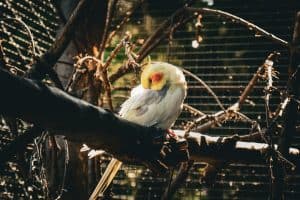
Interestingly, cockatiels don’t necessitate complete silence to sleep. A degree of background noise is tolerable if it’s consistent. The white noise of a fan, for instance, won’t be too bothersome. However, they can become easily startled and woken up by sudden, loud noises.
Loud noises not only disrupt their sleep cycle but can also lead to night frights – an alarming syndrome seen in captive birds where they panic and thrash around their cage, often injuring themselves in the process. Alarmingly, conditions like continual exposure to inconvenient noise levels or not getting enough sleep can thus give way to night fright syndrome.
Similarly, the choice of the cage and its position can influence your cockatiel’s sleep quality. Placing the cage in a noisy environment or an uncomfortable area where disturbances are frequent could lead to a restless pet bird. Consider covering the cage entirely or partially with a cage cover during the night to minimize distractions and facilitate sound sleep.
Sleep is cardinal for maintaining a healthy bird, free from illnesses and stress. Hence, remember to consider the following when ensuring proper sleep for your cockatiel:
- Maintain a quiet environment, especially during the night.
- Use cage covers to block out sudden light or movement changes.
- Limit sudden noises or loud sounds.
Careful observation of your bird’s sleep patterns and responses to noise will guide you in providing an ideal sleeping environment. As a bird owner, prioritizing your cockatiel’s sleep needs and ensuring a peaceful sleep for them is fundamental. By understanding and respecting your feathered friend’s natural behavior, you can create a comfortable living space for a content, lively, and healthier pet cockatiel.
Possible Consequences of Disturbances During Sleep
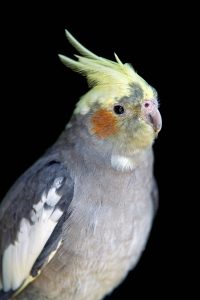
Let’s dive a little deeper into the sleeping habits of these feathered friends of ours. As with all beings, uninterrupted sleep is crucial for a cockatiel to maintain optimal health and well-being.
Exposing your pet cockatiel to loud noises during rest and sleep periods may cause a significant disruption to their sleep patterns. Sleep at night, especially, is a time for birds to rest and conserve energy. For cockatiels, just like most birds, achieving a deep sleep is essential–and noise can interfere.
Routine disruptions, such as sudden noises or noisy environments, can lead to a phenomenon known as night fright in birds. Night frights, common among both young and adult cockatiels, can cause them to panic, often resulting in a frenzy within their cage. A cockatiel in fright might fly around the cage, collide into cage bars, or potentially injure itself due to the surprise and disorientation.
Most cockatiels also happen to be light sleepers. Hence, if the bird’s cage is in a place where loud noise or disturbance is frequent, it might face difficulty sleeping. Poor sleep quality can also result in changes in your bird’s behavior, causing them to be less active or even irritable.
When it comes to baby cockatiels, the requirement for a quiet sleeping environment is even more critical. Not getting enough sleep can hamper the proper growth and development of your feathery baby.
Remember, your pet bird is a creature of habit. Establishing a consistent, noise-free environment around their sleeping cage will help build healthy sleeping habits. Covering the cage at night helps signal your pet that it’s time to sleep, while also helping shield it from any interfering light or noise.
Keep in mind that, while cockatiels might fall asleep in a slightly noisy environment, that does not mean they are getting the sound sleep they need. Hence, for a healthier, more comfortable cockatiel, ensuring an appropriate sleeping habitat – a quiet environment, a properly covered cage after dusk, and understanding the bird’s sleep cycle – should be every bird owner’s priority.
Beloved pet cockatiels, especially, should be spared from nocturnal disturbances for quality sleep and improved well-being. Promoting a healthy bird requires us to be sensitive and informed about their natural behavior and needs–with proper sleep being paramount among them.
Strategies to Encourage Cockatiels to Sleep in Noisy Environments
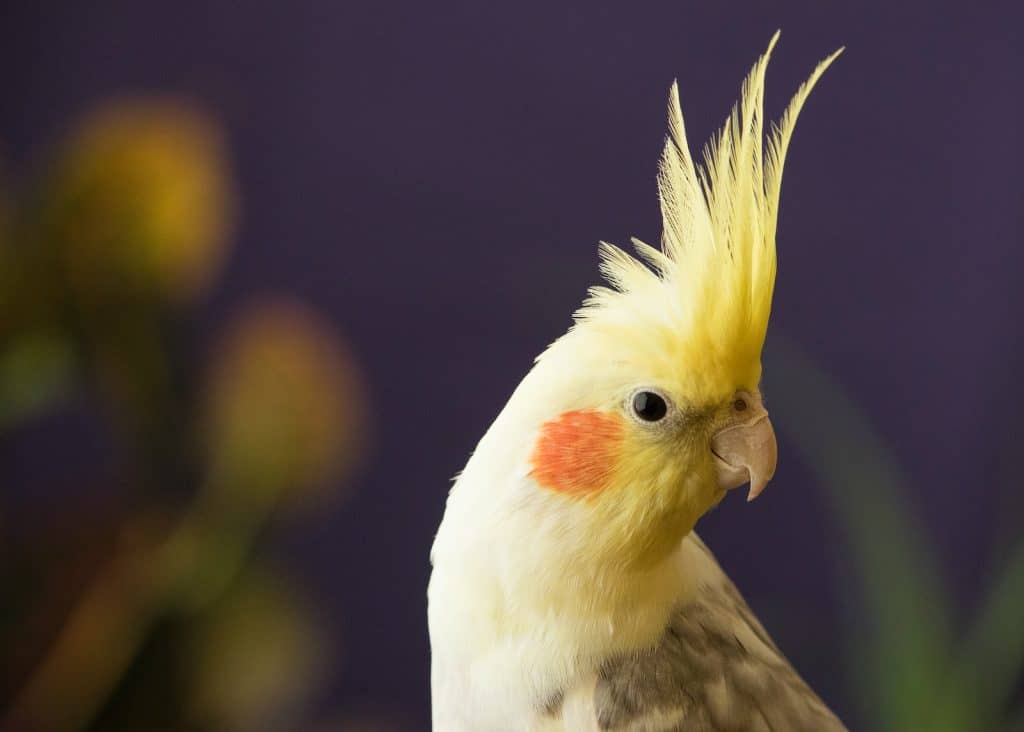
Your pet cockatiel needs his beauty rest, but can cockatiels sleep with noise? While these sociable birds can adapt to some level of noise, keeping the environment as serene as possible during sleep times can ensure your cockatiel gets the deep sleep he needs. Cockatiels sleep better with less noise.
The dedicated bird owner takes measures to ensure that their feathered friend manages to sleep, even amidst all the ruckus. Is it a problem if there are loud noises in your home at night? Yes, it is! Sudden noises can startle your cockatiel out of a sound sleep. This can lead to night frights, a stressful occurrence for most cockatiels, interrupting their sleep patterns.
Start to encourage quietness around the bird’s cage, especially during sleep times. Make sure your cockatiel’s sleeping cage is located in a room with minimum disturbances. Place the cage away from TV sets or audio systems, where loud noise could disrupt the cockatiel’s sleep.
Bird owners should know that cockatiels tend to be light sleepers. They’re easily awakened, and being jolted from sleep abruptly can result in night frights. So, how to manage your beloved pet’s sleeping habits in noisy environments? The answer lies in creating an environment conducive to cockatiel sleep.
You could invest in a noise-cancelling cover to drape over your cockatiel’s cage when it’s time for him to hit the sack. A cage cover helps to muffle any loud sounds and gives your bird enough sleep. Pair this with soothing background noise, like white noise, and your cockatiel could fall asleep even with a little commotion in the background.
It’s also a good idea to provide a dim light or night light near the bird cages. This is because complete darkness can sometimes cause night frights in cockatiels. A softly lit environment can reassure your pet cockatiel, helping him to sleep better.
Making a habit of reducing noise levels during your pet bird’s sleep hours shows respect for their natural behavior and can lead to a healthier, happier bird. Proper sleep is crucial for the well-being of your feathered buddy, just like it is for you.
Final Thoughts on Cockatiels and Noise During Sleep
In conclusion, while cockatiels can tolerate some background noise while they sleep, sudden or loud noise can disrupt their sleeping patterns, potentially causing harm to their health over time. This highlights the importance of ensuring your pet bird’s environment is as calm and quiet as possible during their sleep time to prevent any instances of ‘night fright’ and to maintain their overall health. With careful attention to your cockatiel’s unique sleep patterns, and by establishing a consistent and serene sleep environment, you can promote a healthier, happier, and well-rested pet cockatiel.
